 |
Singapore: Pavement Sweeping for Environmental Health
by Ranger Kidwell-Ross
Due to confusion involving the dateline, which creates a changeover of dates, the EHD managers thought I'd be arriving to interview them the day before. When I actually showed up at the Environmental Health Ministry's headquarters, as far as I knew right on time for our planned meeting, I was exactly 24 hours late.
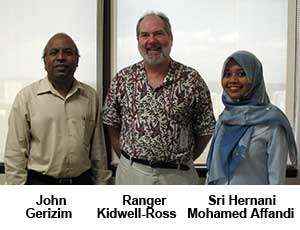
However, within an hour's time, the presentation team had scrambled to re-arrange their schedules in order to accommodate. Sri Hernani Mohamed Affandi, the agency's Environmental Health Executive, even came in from her planned half-day off to narrate the PowerPoint presentation she had prepared for me.
Singapore's sweeping program is overseen by the Environmental Health Department (EHD), which is a component of the country's National Environmental Agency. This choice of oversight agencies shows how seriously pavement cleaning in Singapore is taken. For better management and local accountability, the EHD's operations are carried out through five Regional Offices throughout the country. Overall, there are approximately 790 environmental health officers in the agency countrywide to oversee all aspects of the multi-faceted agency.
In the EHD's 21st floor conference room, Affandi introduced Singapore's current strategy for pavement cleaning. "We employ a three-part strategy," she began, "of combining sensible public health policies with a good sanitation control plan. Then, through community outreach, we inform our citizens about the steps they should be taking in this regard.
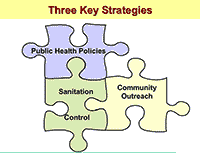
Our government's policy is that a strong public cleansing program is necessary for three primary reasons, as well. These are to minimize any impact on health, to prevent economic loss and to protect our water resources. The principal legislation we have that directs our action is called the Environmental Public Health Act. Our enforcement officers, who are known as 'Hygiene Specialists Environmental Health Executives,' number about 400 in total."
Because Singapore is so industrialized and, one might say, 'pavement-intensive,' its laws in terms of keeping debris – especially litter – from ever hitting the ground are, as I had heard, extraordinary.
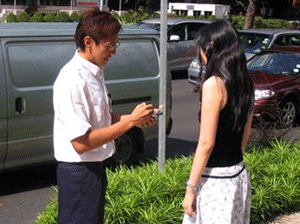
Enforcement against littering is handled by plainclothes patrol officers who conduct routine enforcement rounds. Also, if an area is identified as a 'litter hotspot,' then it becomes part of emphasis patrols, which stake out the area waiting for the culprits. Singapore's anti-littering campaign is clearly a serious program; from what I could see it's enforced quite strictly.
The laws in this regard are based on the country's 1987 Environmental Public Health Act, which provides stiff penalties for throwing refuse in public places, from vehicles, or into watercourses, as well as for using any vehicle for the purpose of dumping. On a judge's order, vehicles used in the dumping of debris may even be confiscated.
First-time offenders can expect a fine of at least $200 Singapore, and in rare cases by as much as $1000. Still don't get the message? Second time offenders may have their pocketbook lightened by as much as $2000 and will also find themselves an "employee" for from three to 12 hours in the 'Corrective Work Order' (CWO) program.
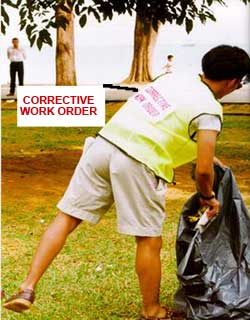
The latter means wearing a distinctive uniform while cleaning up litter in a public place for a number of hours. Subsequent offenses offer an increased amount of high-visibility CWO time and a fine of up to $5000.
Squashed pieces of discarded gum on sidewalks and elsewhere are an eyesore in most countries. However, in Singapore, that confection is not even allowed to be sold in the country or allowed through customers. Still, with every urban environment comes pavement-based debris. Here's how those in charge of Singapore deal with it.
John Gerizim, Senior Manager for Media and Public Relations, joined in. "Up until about seven years ago," Gerizim said, "all the services of road and pavement sweeping, as well as drain cleaning, were provided directly by the government. At that time, the primary task of the Environmental Health Department (EHD) was to ensure that Singapore was clean. To accomplish this, EHD workers swept all the roads and other pavement, as well as checked and cleaned all the drains, if needed, each and every day for all of Singapore.
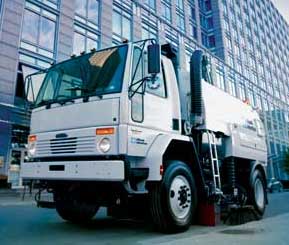 Allianz (formerly Johnston) is the world's largest manufacturer and distributor of street sweepers.
Allianz (formerly Johnston) is the world's largest manufacturer and distributor of street sweepers.
The Allianz/Johnston VT650 is a pure vacuum sweeper renowned and loved for its unbeatable and consistently reliable performance. To date, there are more than 12,000 of these machines in service throughout the world. The VT650 sweeper has won numerous design and export awards and can be found diligently working in most every major city in the world. Its reputation for low maintenance is legendary. Its trademark, gearbox-driven vacuum fan and 343-gallon stainless water tank have made it the repeat choice of governments, contractors, cities, towns and municipalities. From highways to residential areas, from construction sites to palaces and from battlefields to parking lots, the 8.5 cubic yard Johnston VT machines are the undisputed leader and standard bearer of the sweeping industry. We invite you to click here or on the photo for more information. |
"A few years ago, it was decided that providing some of these services should be opened up to the private sector. For that, Singapore was divided into three Cleansing Sectors, called 'Central, Western and Eastern.' Out of consideration for its current workforce, as well as to maintain a presence in that area, the EHD continues to sweep the Eastern section with its in-house workers. This includes 1050 cleansing workers and assorted mechanized equipment. The former are bolstered by the additional workers attached to the contractor crews who are now in charge of sweeping the other two-thirds of the island."
When the five-year contracts were first let for the other two sections, they were lucrative enough to attract international bidders from as far away as France and Germany. One reason is that Singapore has a policy of encouraging foreign companies and investment. It is thought that any competition from abroad will only serve to make Singapore-based companies more competitive in the long-term.
The contracts, which specify cleaning frequencies for all pavement in a given area, include a variety of other, related services, as well. In addition to road and pavement sweeping and storm drain cleaning, contractors are also in charge of litter picking from landscaped areas, beach cleaning, waste receptacle maintenance and disposal of any bulky waste items.
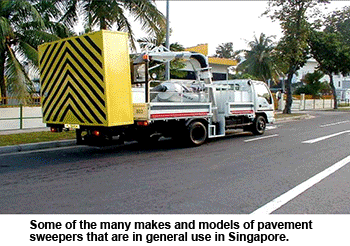
Pavement sweeping is as mechanized as possible because of the country's small pool of labor available to do the relatively unskilled work. Contractors are assumed to be using the right mix of sweeper makes and models to cost-effectively – and effectively – get the job done right. In my experience that's typically true and, as you'll see, there are a number of sweeper makes and models in use. These include chassis-mounted air sweepers for the roadways, as well as a number of smaller sweepers designed for off-road pavement. The various sweepers included ones designed to clean paths, walkways, road shoulders and so on.
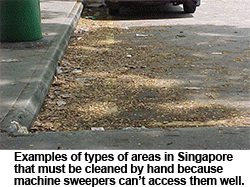
In addition, each contractor employs a team of what are termed 'Cleansing Workmen.' These are used primarily in places where the machine sweepers can't reach: in areas with inaccessible corners, blind spots, or places surrounded by curb lines that don't allow machine access. The storm drains are swept both by hand and by machine, whichever represents the optimal choice.
The Cleansing Workmen, whose primarily tools are a broom, dustpan-on-a-stick and a hand cart debris container, are outfitted with a safety vest, rubber boots (where needed) and cotton gloves. They are also issued a variety of other tools designed to make their job easier, including a rake, a blade for trimming vegetation at the edge of curbs and drains, a spade and three items with names previously unknown to me: a scupper digger, a changkul and a parang. In the U.S., these items are closest to being known as, respectively: spade, hoe and machete
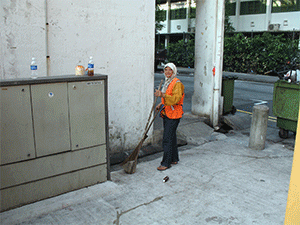
"Each contractor must provide the EHD with a monthly schedule for all of its planned work," continued Affandi. "This includes machine and manual sweeping for roadways and other pavement, as well as a schedule for drain cleaning and any other standard contract items that were included in the bid.
"In addition, the contracts have a provision for 'ad-hoc work,' which are unplanned or emergency items that crop up over time. For these, the contractor needs to be specially commissioned to proceed, and this is based on a quote they provide on the scope of work needed, computed at current contract rates."
The standards specified by the City in its cleaning contracts are stringent. They include:
- Immediately after cleaning each area must be free of all litter, leaves, twigs, blossoms, branches, etc.
- Cleaning must include roads, pedestrian thoroughfares, adjacent non-pedestrian areas, grass verges, scupper (catch basin) holes, open scupper drains and drop inlet chambers.
- Litter bins to be wiped after each emptying.
- Open drains to be free-flowing and with no blossoms growing out of them.
- Bulky items to have been removed.
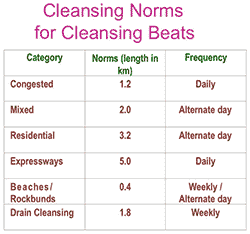
These standards apply equally to both machine- and human-cleaned areas, whether by a contractor or by EHD personnel. And, as you can see by the chart showing cleaning frequency of the different types of areas, Singapore takes its cleanliness very seriously, as befits a country that's island-based and whose leaders understand the connection between pavement cleanliness and the long-term maintenance of a high quality water supply. Due to its high profile tourism industry, extra emphasis is given to all areas likely to be visited by them.
Quality control is initially done by the contractors' supervisors or, in the case of city-cleaned areas, by a supervisory team reporting to the city managers in charge of that sector. In addition, separate EHD supervisors audit contractor-cleaned areas on a daily basis, and conduct random checks on the sweeping done in-house.
I was impressed with the emphasis given to the required training for supervisors involved in the oversight process. (And, as you'll learn in the upcoming article, a national training program for sweepers exists, as well.) In addition to being familiar with the sector under their charge, supervisors are expected to be aware – so they can provide extra scrutiny of – any problematic or sensitive areas on a given route.
Supervisors are required to know all of the routes in detail, what all the schedules and frequencies are and how the cleaning is done, i.e., is the cleaning at a particular spot being done by machine or by a cleansing workman. Finally, for the areas being done in-house, they are even trained to assess the strengths and weaknesses of their subordinates involved in cleaning that geographical area.
For routine sweeping, a default point schedule is used to define penalties on an objective basis. Points are given for lapses in quality, and there is an automatic reduction in the money that's paid based on the number of points issued in a time period. As in the other areas of Singapore, penalties appear to be genuine, and designed to modify unwanted behavior.
For poor performance in emergency, or what they call 'ad hoc,' work, penalties are imposed according to a liquidated damage schedule specified in the contract. For emergency work this is typically $100/hour.
The extensive sweeping, and associated cleanup programs, employed by Singapore are a present-day snapshot of what everyone will ultimately need to be doing to make sure the pollution buck stops at its source. Unfortunately, with few exceptions in the majority of countries I've seen, the cost of polluting is still largely passed down the line to whoever's downstream. Singapore simply doesn't have that luxury. I credit the country's managers with coming to that realization, and with using what appears to be every available mix of technology and down-to-earth human cleaning and education technique to minimize the advance of pollution in the country.
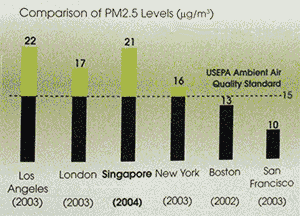
However, as have many other cities around the world, Singapore has faced difficulty attaining the air and water quality standards recommended by the USEPA. For example, the last statistics available show the city to be 40% over the USEPA recommended standard. Although this places it ahead of Los Angeles, Singapore is still behind most other U.S. cities. Maintenance of water quality standards over time is recognized as an ongoing challenge, since the country is, in essence, a closed system.
Singapore officials recognize the fragility of their own small segment of the planet and, in my experience, are clearly one of the leaders in doing all that can be done to keep it clean. Seeing the recognition Singapore has in that regard, I was reminded of an anonymous poem I read some years ago that summed up the care that might be taken of the Earth if only we were able to see how fragile it is. That poem, through the magic of Internet search engines, is shown at the bottom of this page.
After lunch, Ms. Affandi then drove me across town for an interview with Tan King Bok, vice president of SembEnviro, the private contracting firm involved with the sweeping and public cleansing for two of the three sections into which Singapore's sweeping program is divided.
This story was one written during our editor's trip to Singapore and Thailand in 2007 to investigate how sweeping was done in those countries. If you have questions or comments, please let us know.
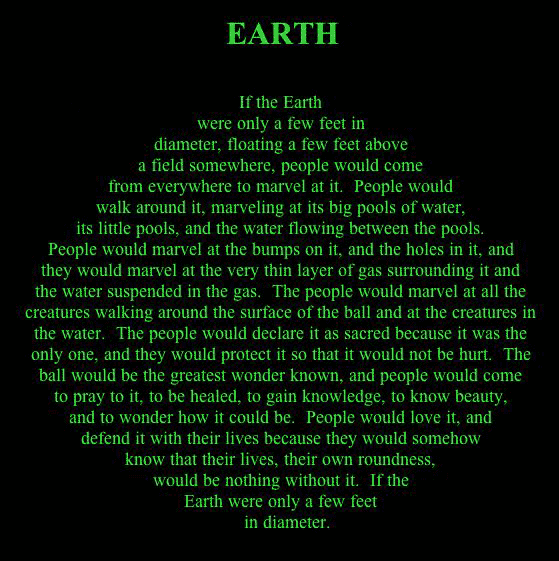
 |
 |
© 2005 - 2021 World Sweeper
|
Countries Contents
|